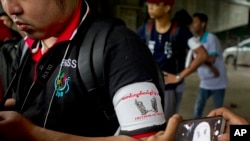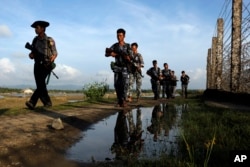After militants from Myanmar’s persecuted Rohingya Muslim minority launched deadly attacks on border guard posts in October, several journalists sped to Maungdaw in northern Rakhine State to cover the military operation that followed.
But they soon discovered they would be allowed to document little.
Wearing a flak jacket and helmet, Kaung Htet, the 34-year-old director of photography at the Myanmar Times, arrived at a roadblock with colleagues and was told to head back for security reasons.
“The problem is you can’t expect the permission from the authorities, from the government authorities, with police or soldiers ... it's almost impossible. We told them, we explained to them, that’s our profession, we know all the risks," he said. "But they insisted, they can’t let us in.”
Lack of media access
In addition to obvious safety concerns, Myanmar’s conflict journalists deal with several obstacles in covering numerous conflicts since its independence in 1948.
These include a lack of access to conflict zones, concerns about what content publications are permitted to publish, language barriers and trust issues between reporters and ethnic armed groups, and the military’s reluctance to let the media document crackdowns that have led to allegations of human rights abuses.
There are also emerging legal issues. Myanmar’s transition from military rule in 2011 led to the election of Aung San Suu Kyi’s National League for Democracy party four years later.
Journalists arrested or worse
Late last month three journalists were arrested after attending a drug burning ceremony in northern Shan State held by the Ta’ang National Liberation Army. They were charged under the Unlawful Associations Act, which has been used by the military to cut off support for rebels and as a way of scaring off media organizations that operated in exile before being welcomed back into the country as part of the democratic transition.
In theory, the abolishing of censorship in 2012 and the passage of a media law that guarantees rights to report on conflict without detention should mean local journalists are able to report on Myanmar’s civil wars without fear of being accused of aiding insurgents. But as many cases show, the reality is different.
In 2015, the military warned the media not to broadcast statements made by another rebel group, the Myanmar National Democratic Alliance Army or they would “face action under the law.” In 2014, journalist Ko Par Gyi was covering clashes in Mon State when he was detained and killed while in military custody.
“Reporters covering Myanmar's many ethnic armed conflicts face grave risks, some of which could be lifted with a few simple legal reforms,” Shawn Crispin, the Southeast Asia representative for the Committee to Protect Journalists, said in an email. “The military continues to threaten journalists who report from areas controlled by rebel groups with charges of unlawful association, an outdated colonial era law that should be immediately purged from the penal code."
The three journalists arrested last month, Lawi Weng from the Irrawaddy and Aye Naing and Pyae Bone Naing from the Democratic Voice of Burma, could get three years if convicted.
Fighting has increased
Fighting has surged since the breakdown of a cease-fire between the military and one of the more powerful ethnic armed groups, the Kachin Independence Army, in 2011. As clashes increase, access diminishes.
“What we’ve seen in recent years in Myanmar is a growing set of restrictions on human rights monitors, on journalists, on international and national humanitarian actors trying to provide assistance to people affected by the conflict. And it appears to be getting worse,” said David Baulk, a Myanmar specialist for the NGO Fortify Rights. “And it means that when you try to get information from these areas you are doing so at enormous personal risk.”
Months after the October attacks in Rakhine State, the government has, with rare exceptions, made the northern part of the state a no-go region for the media, and last month it said it would deny visas to U.N. investigators probing allegations of crimes against humanity that surfaced during the military operation.








